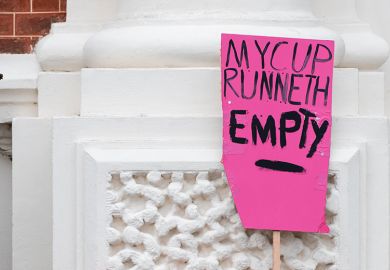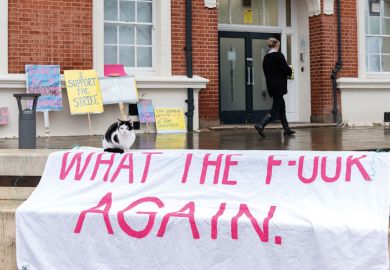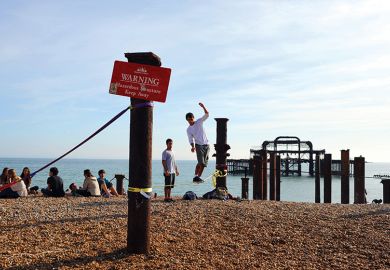Fatigue from the pandemic and years of battling over pay and pensions are likely to have depressed turnout in the UK strike ballots, academics said, leaving the University and College Union facing uncertain paths through the disputes.
Although UCU members who voted resoundingly backed walkouts, non-participation and the 50 per cent turnout threshold for industrial action imposed by the Westminster government mean that the union has a mandate to strike at just 58 of the 152 institutions that it polled: 21 over this year’s pay offer from employers, 33 over pay and reforms to the Universities Superannuation Scheme, and four over pensions only.
The UCU’s higher education committee was due to meet on 12 November to decide on next steps, including whether and when to reballot some branches. Jo Grady, the union’s general secretary, claimed that the ballot results gave the union “a big mandate to take strike action, at a time of our choosing”.
But some academics raised concerns about the possible impact of a fourth round of widespread walkouts in little over three years, further disrupting the education of undergraduates who have also seen their on-campus learning significantly interrupted by the coronavirus pandemic.
“The pandemic and resulting teaching difficulties have clouded the picture, and many staff are fighting that battle rather than the bigger national one on pay, pensions and contracts,” said Roger Seifert, professor of industrial relations at the University of Wolverhampton.
Although the National Union of Students has backed the UCU’s planned strikes, Professor Seifert said students at some universities were less supportive of industrial action than before. He argued that staff were “depressed and discontent” with the approach of sector leaders and the government, but that this did not necessarily translate into support for walkouts.
“Overall, widespread battle fatigue and general insecurity has meant an uneven ballot outcome. It remains to be seen if action in some places triggers more activity elsewhere and thus creates a snowball effect,” he said.
Glen O’Hara, professor of modern and contemporary history at Oxford Brookes University, agreed that exhaustion was a big factor. “People are working so hard, especially during term-time, that they don’t have the ability to engage,” he said. “There is a sense among colleagues with pensions, for example, that we will just be back here in a year or two.
“There is also some ambivalence about going on strike on students who’ve had such a rotten time, which is not to comment on the rights or wrongs of doing so, but just that they feel they can’t, and the easiest way of not striking is not to vote.”
James Sumner, a lecturer in the history of technology at the University of Manchester, said he was “not seeing the case that members are any less keen to vote” but that allowing only three weeks for a mail ballot had affected turnout. “There have been endless reports of ballot papers not turning up and replacements arriving too late to count,” he said.
Michael Carley, senior lecturer in the department of mechanical engineering at the University of Bath and a former chair of the local UCU branch, said that overall turnout had been similar to previous years and that the disruption caused by Covid-19 had galvanised anger over casualisation, which was likely to become an increasing focus for the UCU.
“I think there’s an attitude that any action is going to be a bit of a grind, and the real question is, how do you channel this into something effective?” he said.
POSTSCRIPT:
Print headline: UK scholars’ strike fatigue leaves union facing uncertain path
Register to continue
Why register?
- Registration is free and only takes a moment
- Once registered, you can read 3 articles a month
- Sign up for our newsletter
Subscribe
Or subscribe for unlimited access to:
- Unlimited access to news, views, insights & reviews
- Digital editions
- Digital access to THE’s university and college rankings analysis
Already registered or a current subscriber?








